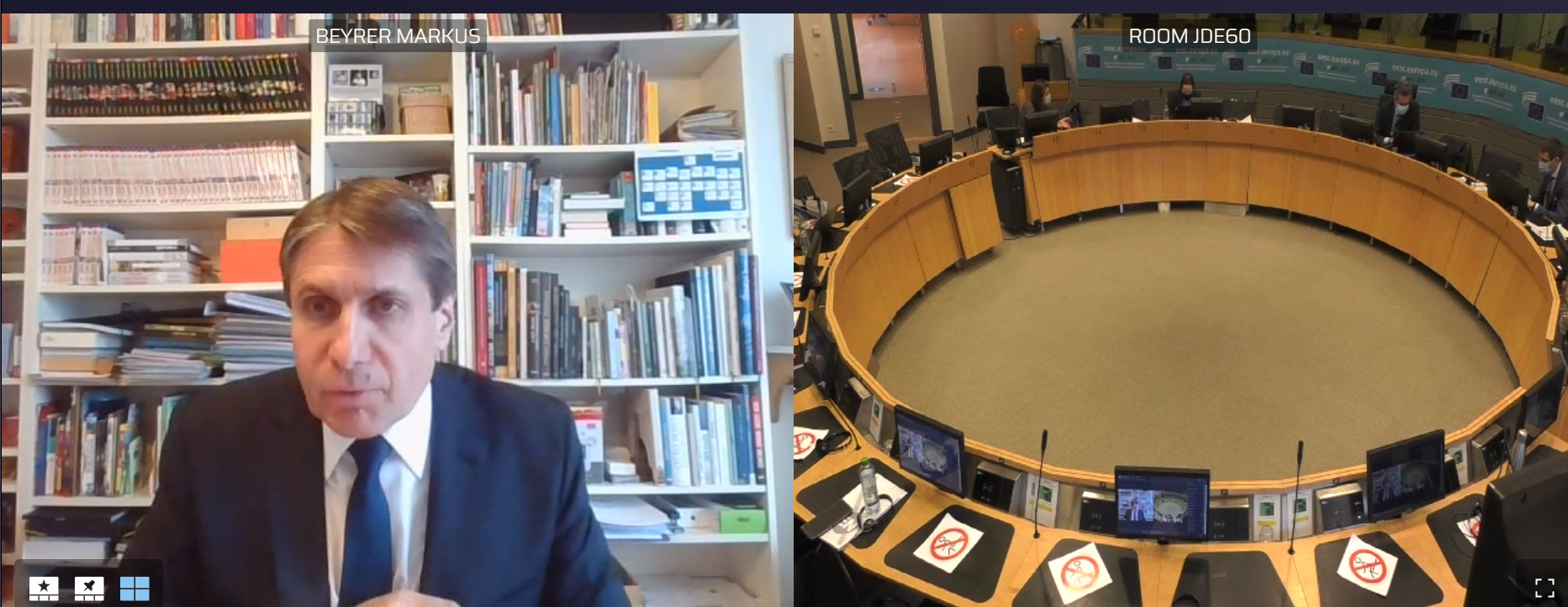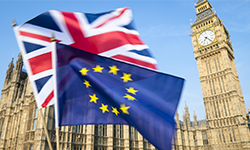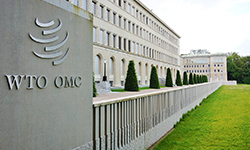BusinessEurope Headlines No. 2021-02
Shaping the post-COVID recovery to forge the Future of Europe

On 27 January, BusinessEurope Director General Markus J. Beyrer participated in a debate on "Shaping the post-COVID recovery to forge the Future of Europe" organised by the Employers' Group of the European Economic and Social Committee. Together with representatives of SMEunited and Eurochambres he discussed the necessity for an ambitious, coherent and future-oriented policy agenda for the next months and years. "It will be key to embed the digital and green transitions in a broader industrial strategy to achieve a long-lasting and resilient recovery after this crisis. The recovery money must be used wisely and encourage structural reforms that allow our economic base to generate employment and prosperity across Europe", Beyrer said. He particularly stressed the importance of the international agenda including the re-strengthening of the transatlantic relationship with the Biden administration and the need to ratify the EU-Mercosur trade agreement as swiftly as possible.
Contact: Jasmin Ploner
Our comment:
The EU economy fared a little better than feared in the autumn, but business confidence remains low
By Malthe Munkøe, Senior Adviser, Economics

Monitoring and forecasting the trajectory of our economy has never been more difficult than now, since developments are so heavily dependent on non-economic factors for which we have no precedence in living memory. In particular, how long the pandemic requires us to keep lockdowns in place, and how fast we can roll out vaccinations to allow them to be gradually eased.
At the same time, it has rarely been more important to correctly estimate the state and trajectory of our economies, because policymakers need this knowledge to respond effectively to the crisis created by the lockdowns necessitated by the pandemic.
If we get economic policy wrong at this crucial juncture and unwind support schemes prematurely, we risk another recession. A danger that was vividly illustrated in the aftermath of the financial crisis when policy makers arguably tightened monetary and fiscal policy too early. However, we cannot allow these unprecedented times to develop into a new norm, but must be prepared to move back towards sustainable fiscal positions, focusing our efforts on structural business- and growth-friendly reforms as we do so.
At BusinessEurope we have been in continuous contact with the European institutions regarding how businesses experience conditions on the ground and how they see the economic situation developing. In the autumn we published an economic outlook forecasting a 7.3 percent GDP drop in 2020 followed by 5.0 percent growth in 2021. I still consider this forecast realistic, although developments in recent months of course give reason to reassess the situation.
Two major non-economic developments have taken place recently: first, the virus outbreak resurged stronger than we expected, necessitating a second wave of strict lockdowns. Secondly, effective vaccines were developed, approved and deployed much sooner than I had expected, with vaccinations in the EU beginning on 27 December.
Recent data releases show that the German economy contracted by 5.0% in 2020. This is somewhat more positive than our autumn forecast, where we expected a 5.4% drop. Whilst we still await GDP data for other EU economies, other leading indicators are less negative than might have been expected. Manufacturing has performed relatively strongly in recent months in the EU, boosted by strong export demand, including from the United States and China. Having increased productions to stockpile ahead of the end of the UK-EU transition period, the outlook has also been boosted by the agreement for a UK-EU trade deal. Consumer spending also bounced back very strongly as soon as lockdowns were lifted in the spring, and a repeat seems likely once the second wave of lockdowns are eased or lifted later this year.
That does not mean everything is rosy. Business confidence, especially in the services sector, remains very low. Business confidence levels were only partially restored after the lockdowns ended in the summer of 2020 and have since dropped with the reimposition of lockdowns. And as long as business confidence remains at low levels, we are unlikely to see a significant pick-up in business investments, which is necessary to drive growth and help our economy fully recuperate from the crisis.
Looking forwards, the outlook for 2021 will continue to depend on the evolution of the virus, including more transmissible mutations (requiring stricter lockdowns), and the successful roll-out of vaccines that prove able to provide protection against any widespread COVID variants.
Our ability to disseminate vaccines will likely become more effective with lessons-learned, but the amount produced and made available to EU member states will remain a key constraining factor the following months. A positive but realistic scenario is that vaccinations allow restrictions to be gradually lifted through the spring with consumer confidence and spending, bolstered by the onset of the tourism season, also gradually returning, setting the stage for a strong recovery in the second half of the year.
Similarly, the key downside risk is that new strains of the virus rapidly spread within the EU, the possibility that current vaccine are less effective in dealing with them, prompting government placing new restrictions on business activity. Another significant concern I have at this stage is that many companies already have taken on loans and spent their free capital to survive through the first period of lockdowns. With the end now in sight due to the vaccine roll-out I expect businesses to generally be able to weather another lockdown, provided the necessary government support schemes remain in place. Regardless, we will see more insolvencies, and this does pose a significant downside risk to the economic outlook in the coming months.
2021 may not be the year we were dreaming of, neither in economic terms or in a broader sense, with lockdowns likely to remain in place at least for some time, and vaccinations rolling out slower than one might have hoped. However, the path back to a full recovery is still long and uneven, and dependent on a continued commitment from policymakers to support our businesses and economies through this very difficult period.
Transatlantic business pledges cooperation on shared goals
 On 27 January, in a joint statement of BusinessEurope and the U.S. Chamber of Commerce, the Transatlantic business community pledges to EU and US authorities to cooperate and advance shared goals. As President Biden underlined in his inaugural address, the U.S. will repair its alliances and engage with the world to meet "today's and tomorrow's challenges". The U.S. Chamber and BusinessEurope welcome this commitment as well as the European Commission’s recent policy paper embracing a new Transatlantic agenda. Our statement is a call on the EU and the U.S. to redouble joint efforts to rejuvenate the relationship and initiate a new strategic partnership that would improve our ability to seize the opportunities of tomorrow. We should start by addressing the problems and moving forward to advance common objectives.
On 27 January, in a joint statement of BusinessEurope and the U.S. Chamber of Commerce, the Transatlantic business community pledges to EU and US authorities to cooperate and advance shared goals. As President Biden underlined in his inaugural address, the U.S. will repair its alliances and engage with the world to meet "today's and tomorrow's challenges". The U.S. Chamber and BusinessEurope welcome this commitment as well as the European Commission’s recent policy paper embracing a new Transatlantic agenda. Our statement is a call on the EU and the U.S. to redouble joint efforts to rejuvenate the relationship and initiate a new strategic partnership that would improve our ability to seize the opportunities of tomorrow. We should start by addressing the problems and moving forward to advance common objectives.
![]() Contact: Eleonora Catella
Contact: Eleonora Catella
The green economy and the future of EU industry
 "The European Green Deal should become a real driver of growth and support the ongoing industrial transformations. For this to happen, the upcoming Green Deal legislations must strike the right balance between driving ambition, supporting innovation and ensuring competitiveness", said Alexandre Affre, BusinessEurope Deputy Director General, at the Vilnius GreenTech Forum on 26 January. Following an intervention of European Commissioner Virginijus Sinkevičius, Affre exchanged views on the green economy and the future of the EU industry at a panel with Vidmantas Janulevicius, CEO of the Bod Group and President of the Lithuanian Confederation of Industrialists (LPK). In their conversation, Affre and Janulevicius touched on some of the main challenges ahead, such as the huge mobilisation of public and private investments, the need for stronger carbon pricing convergence worldwide and expectations on climate policy from the new US administration.
"The European Green Deal should become a real driver of growth and support the ongoing industrial transformations. For this to happen, the upcoming Green Deal legislations must strike the right balance between driving ambition, supporting innovation and ensuring competitiveness", said Alexandre Affre, BusinessEurope Deputy Director General, at the Vilnius GreenTech Forum on 26 January. Following an intervention of European Commissioner Virginijus Sinkevičius, Affre exchanged views on the green economy and the future of the EU industry at a panel with Vidmantas Janulevicius, CEO of the Bod Group and President of the Lithuanian Confederation of Industrialists (LPK). In their conversation, Affre and Janulevicius touched on some of the main challenges ahead, such as the huge mobilisation of public and private investments, the need for stronger carbon pricing convergence worldwide and expectations on climate policy from the new US administration.
Contact: Alexandre Affre
Business discusses EU-UK trade and cooperation agreement
 On 27 January, BusinessEurope hosted a discussion on the EU-UK partnership agreement between European business federations and the European Commission service for the EU-UK agreements. At the event, Commission representatives explained the agreement in detail and answered the questions of business representatives. On the same day, BusinessEurope spoke on the impact of the EU-UK deal on workers and jobs at a dedicated webinar organised by the European Parliament S&D UK taskforce. "The agreement was an immense relief for the business community as it brought legal certainty and mitigated the impact of the end of the transition period. We now need to make sure that it is duly implemented and that solutions for all outstanding issues are found," Benedikt Wiedenhofer, Adviser in the International relations department of BusinessEurope, said at the event.
On 27 January, BusinessEurope hosted a discussion on the EU-UK partnership agreement between European business federations and the European Commission service for the EU-UK agreements. At the event, Commission representatives explained the agreement in detail and answered the questions of business representatives. On the same day, BusinessEurope spoke on the impact of the EU-UK deal on workers and jobs at a dedicated webinar organised by the European Parliament S&D UK taskforce. "The agreement was an immense relief for the business community as it brought legal certainty and mitigated the impact of the end of the transition period. We now need to make sure that it is duly implemented and that solutions for all outstanding issues are found," Benedikt Wiedenhofer, Adviser in the International relations department of BusinessEurope, said at the event.
Contact: Benedikt Wiedenhofer
78 global business organisations support e-commerce rules under the WTO Joint Statement Initiative
 Along with 77 other global business organisations, on 26 January BusinessEurope co-signed a multi-industry statement on cross-border data transfers and data localisation disciplines in the context of negotiations under the WTO Joint Statement Initiative on e-commerce. "The ability to access technology and transfer data securely across international digital networks is of central importance to our operations, employees, customers, and supply chain partners, including MSMEs. No business can conduct international trade or commerce without this ability", reads the statement. "To enhance certainty and economic opportunity", it continues, "any agreement should discipline unnecessary or discriminatory data localisation mandates and data transfer restrictions". These elements are critical to enable countries to fully reap the benefits of digital economy.
Along with 77 other global business organisations, on 26 January BusinessEurope co-signed a multi-industry statement on cross-border data transfers and data localisation disciplines in the context of negotiations under the WTO Joint Statement Initiative on e-commerce. "The ability to access technology and transfer data securely across international digital networks is of central importance to our operations, employees, customers, and supply chain partners, including MSMEs. No business can conduct international trade or commerce without this ability", reads the statement. "To enhance certainty and economic opportunity", it continues, "any agreement should discipline unnecessary or discriminatory data localisation mandates and data transfer restrictions". These elements are critical to enable countries to fully reap the benefits of digital economy.
![]() Contact: Sofia Bournou
Contact: Sofia Bournou
Calendar 
- 10 February: Taxing the digital economy: Opportunities and consequences - webinar by the German Economic Institute (IW)
- 23-26 February: EU Industry Days 2021
Not yet a subscriber? Register here.
Reminder: please have a look at our privacy policy